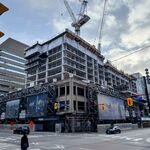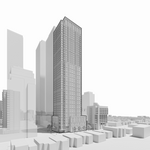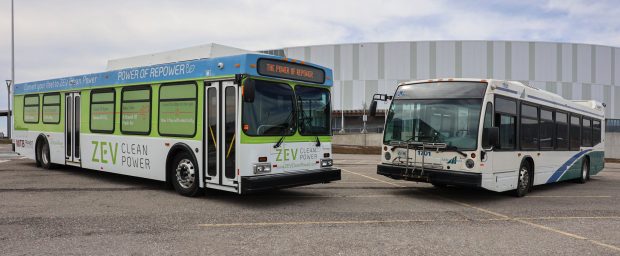TTC adds 336 new hybrid-electric buses to its fleet
April 19, 2023
The TTC is receiving the first of 336 additional hybrid-electric buses as part of its transition to a completely zero-emissions fleet. These comfortable, reliable, and eco-friendly buses, which begin arriving this month, will enter service in May after undergoing inspection and testing. This process will continue through to early next year.
All of these vehicles will replace existing buses that have reached the end of their useful life, including 68 sixty-foot hybrid-electric buses, which will replace older forty-foot buses, adding significant capacity to the fleet and reducing travel times. These buses will be based out of the TTC’s Mount Dennis and Wilson divisions and will serve routes in midtown, downtown, North York, and Etobicoke.
“Hybrid-electric buses offer residents and visitors a clean, quiet, and healthy alternative to travel around our city,” said Deputy Mayor Jennifer McKelvie. “These new buses demonstrate the City of Toronto’s continued efforts to reduce our cumulative carbon footprint, shape a sustainable city, and achieve our goal of net zero emissions by 2040.”
The TTC Green Bus Technology Plan, approved by the Board in Nov. 2017, includes the procurement of low-emissions hybrid-electric buses ending in 2024, and only zero-emissions buses starting in 2025. The target is to have an entirely zero-emissions fleet by 2040. This is a critical step in the City of Toronto’s TransformTO Net Zero Strategy and is aligned with international commitments through the Fossil-Fuel-Free Streets Declaration.
“We are very pleased to be moving forward with our sustainability goals, while also providing a better transit experience for our customers,” said TTC Chair Jon Burnside. “The arrival of additional hybrid buses means fewer greenhouse gas emissions, improved air quality, and newer vehicles for our customers and employees.”
“The TTC is committed to being completely zero-emissions by 2040 or sooner,” said TTC CEO Rick Leary. “As eBus technology is still developing, we’ve purchased hybrid-electric buses, which are a proven transition technology. With the addition of these new, modern vehicles to our fleet, we are well on our way to achieving our goals while continuing to focus on delivering reliable service.”
Today’s hybrid bus is as close as possible to being a fully battery-electric bus (eBus) as it is driven by an electric motor powered by an onboard battery system. The only distinction between a hybrid and an eBus is that the hybrid has an onboard generator that produces electricity when needed. The benefits of the hybrid-electric fleet are estimated as follows:
• Reduces greenhouse emissions by 12,000 tonnes annually. To remove this amount of carbon dioxide naturally, a new forest would need to be created in the City of Toronto that is over 14,000 acres in size, or over 4,500 city blocks. Over the 13-year life of these buses, that’s the equivalent of 156,000 tonnes of carbon dioxide.
• Reduces diesel cost by $6,864,300 annually. Over the 13-year life of these buses, that’s a savings estimated, conservatively, at over one hundred million dollars.
• Eliminates idling in traffic and at bus stops using engine stop/start technology.
• Enables upskilling for operators and maintenance employees through an all-electric propulsion system and all-electric accessories, including doors, HVAC, power steering, and air compressor systems.
In Feb. 2022, the TTC awarded contracts for 336 hybrid-electric buses to be delivered in 2023 and 2024 as follows:
1) Nova Bus: 134 forty-foot hybrid-electric buses
2) New Flyer Industries: 134 forty-foot hybrid-electric buses
3) New Flyer Industries: 68 sixty-foot hybrid-electric buses
With this procurement, one third of the TTC’s bus fleet will be made up of low or zero-emissions buses by mid-2024. This is the final hybrid-electric bus procurement before the TTC transitions to eBus-only vehicle purchases moving forward.







